Posts Tagged ‘Entrepreneurship’
299 Ukraine: How 3 Entrepreneurs Make A Massive Difference with Denys Gurak of A.D.A.M., Iryna Savytska of Bank of Memories, Dr Amarjot Singh of Skylark Labs
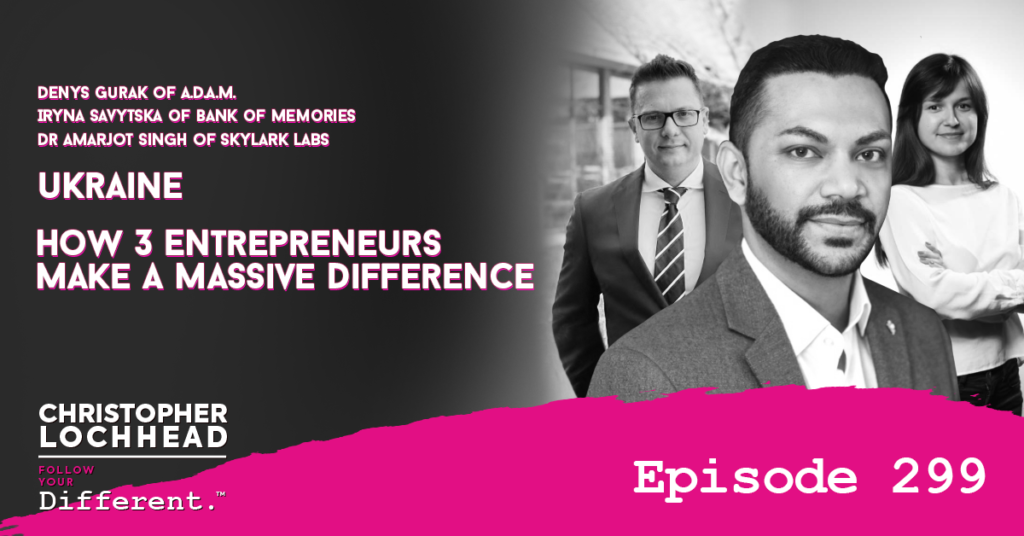
Podcast: Play in new window | Download (Duration: 1:06:41 — 45.8MB) | Embed
Subscribe: Apple Podcasts | Spotify | Pandora | RSS | More
On this episode of Christopher Lochhead: Follow Your Different, we have a much-needed conversation with Denys Gurak of A.D.A.M., Iryna Savytska of Bank of Memories, and Dr. Amarjot Singh of Skylark Labs about the commitment to make a difference and standing up for what you believe in. We also get into how entrepreneurs and startups in Ukraine are answering the call to help their homeland from within and beyond.
Denys Gurak and his company A.D.A.M. is a pioneering 3D bio printing company whose primary focus is 3D-printing bones, with the hopes of using the technology to assist medical professionals in helping injured soldiers.
Iryna Savytska is the CEO of Bank of Memories, which is a blockchain startup focused on allowing families to protect the memories of all their loved ones, as well as key documents and assets for the next generation.
Dr Amarjot Singh is the founder and CEO of Skylark Labs, a company that is designing a new category of next gen AI powered security products that can detect and save people from drone attacks and other threats.
These three entrepreneurs and category designers prove the axiom, “Everything is the way that it is because somebody changed the way that it was.” And they are changing the way that it is.
A Snapshot of life in Ukraine
The conversation begins with a question about the current conditions inside of Ukraine, and what are the immediate concerns that the public needs to know and help with if they can.
Iryna shares the news of the recent rocket barrage by Russia, which was quite a dangerous yet almost routine for them nowadays. One of the things that hit the most is the current conditions in Ukraine, where they are forced to rely on generators to get electricity and water, things that people in the 21st century shouldn’t be worrying about anymore.
She also describes the situation in some areas outside Kyiv, where looting and robbing houses have been happening. Most are being done by Russian soldiers, but there have also been other unscrupulous people taking advantage of the confusion around them to loot and steal.
Physically away, mentally in Ukraine
Denys Gurak talks about his experience living outside of Ukraine and seeing what is happening on the ground from the outside looking in. He shares that a lot of Ukrainians he knows who are also living in the US feels a certain guilt that they’re not there and physically support their families and countrymen.
But he says that rather than wallow in guilt, it’s better to convert it into somethings productive and helpful for their countrymen, and do whatever they can even from a distance.
When asked if it was a fucked-up thing for a young entrepreneur like themselves to be thinking about war and what to do about it, Denys has this to say:
“Actually, it gives you experience and makes you stronger. I mean, you have to try to switch any situation from a problem to an opportunity. Otherwise, you can just sit at home on the couch and do nothing. And for many of us, that’s not an option now, is it?” – Denys Gurak
Dealing with Drones
Dr Amarjot Singh talks about drones, particularly on what they are developing at Skylark Labs. Their aim is to use drones on the side of Ukraine to help guiding systems and give a pre-emptive warning to people that Russian drones have been sighted in the vicinity.
One of the issues with the usual procedures is that drones usually flight high and are hard to find using conventional means. Skylark aims to counter this with drones of their own, but focus on counteroffensive rather than escalation.
That said, this technology can eventually help in surveillance and exploration of certain areas, especially once it has been developed to withstand different weather and abrasive conditions. Dr. Singh and his team are hopeful that it can be very helpful in maintaining a clear airspace in Ukraine and monitoring towns and other areas for national security.
To hear more from these amazing people, their startups and how they are helping in the Ukraine effort, download and listen to this episode.
Bio
Denys Gurak
Denys Gurak is an experienced C-level manager and serial entrepreneur. He is a CEO and Co-Founder at A.D.A.M., a 3d bioprinting company with a primary focus on 3D-printed bones. Denys’s ultimate vision is to build an on-demand personalized tissue manufacturing platform that would be a one-stop shop for transplanted tissues and organs; and, hence, to cut barriers to medical treatment for millions.
Denys’s passion for biotech can be traced back to 2010, when he was leading the international relations and certification, along with EU legislation adaptation at the Ukrainian medicinal products regulatory authority (official position – director of the «GMP/GDP Center» of the State Administration of Ukraine on Medicinal Products (SAUMP).
In 2014 Denys joined the Ukrainian Defense Industry (a state defense conglomerate) in 2014 as the Deputy Director-General for foreign economic activity. During his time at the company, he managed the export-import operations that amounted to USD 1 billion yearly turnover.
Furthermore, Denys represented Ukraine as the Head of Ukraine’s delegation to the NATO Industrial Advisory Group (NAG), and led the industry transformation initiatives, including innovations development and technology JVs, as well international relations.
Denys is a Venture Partner at ff Venture Capital a high-performing early-stage venture firm based in NYC and Warsaw, Poland, focusing on disruptive IT, biotechnology, aerospace and security projects in CEE region.
His passion for strategic modeling and technological disruption, as well as his outstanding networking skills and analytical mindset define Denys’s active role in expert society. Besides business matters, Denys is the key member in a number of think tanks and NGOs.
Iryna Savytska
Iryna Savytska has 12 years in Business Development, MBA, 3 years in web3.
She’s a Tim Draper and Erasmus Scholar, been named TOP 20 Women in ICT 2021 Women Tech Network (Silicon Valley), named a TOP 20 Women in Tech Entrepreneurship 2020 Ukraine according to USAID
She’s raised 15 million USD in investments, and lived in 4 countries, and speaks 4 languages.
Iryna is founder and CEO of Bank of Memories, a service that helps to keep memories and assets and pass them on to new generations. The technology behind is blockchain and decentralization. This way the data will be stored permanently, safely, and available even for future generations.
Key features include:
- Family tree
- Smart storage with 3D memories – image, voice, background
- Time Capsules
- Digital will
Backed by Angel investors, blockchain protocol, advised by Paul Allen, founder of Ancestry.
Dr Amarjot Singh
Dr Amarjot Singh, the founder and chief executive officer (CEO) of Skylark Labs Inc. (https://skylarklabs.ai/), develops next-gen AI-powered security products to identify and continuously learn new known threats.
These systems can revolutionize reconnaissance operations across the land, sea, and air by proactively alerting for known and unanticipated threats beyond visual line-of-sight (BVLOS).
Their proprietary systems analyze cameras and radars on land, drones, helicopters, missiles, and satellites, with primary National Security and Public Safety applications.
Before launching Skylark, Dr Singh worked as a research fellow at Stanford University, USA, as part of the DARPA’s Life Long Learning (L2M) program (2019-2021). Dr Singh developed a framework for Artificial General Intelligence (AGI) at DARPA, allowing models to identify and learn new threats continuously. Before DARPA, Singh received his doctorate in Artificial Intelligence (Deep Learning) from the University of Cambridge, the UK in 2018.
He has also been associated with several other institutions, including Massachusetts Institute of Technology (MIT), Harvard University, National University of Singapore (NUS), INRIA Sophia Antipolis, France, University of Bonn, Germany, Simon Fraser University, Canada, Indian Institute of Science (IISc), Bangalore, India, Innovation for Defense Excellence (Indian Defense) etc.
Singh has made several practical and academic breakthroughs using his breakthrough AI technology in artificial intelligence and computer vision with over 50 international journal and conference publications, along with four provisional patents.
His age-invariant face recognition app for non-profits led to the rescue of 13 trafficked children from brothels in India, placing him on the prestigious MIT 35 under 35 list.
His research on ‘Disguised Face Recognition’ and ‘Violent Activity Detection from Drones’ gained international attention and was covered by several media houses, including the BBC World News, London, NBC, USA, ABC Radio, Australia, Telegraph, UK, Discovery Channel, Canada, New Scientist, The cover of the Economist, Vice, Inc. etc.
Links
Connect with Denys Gurak
A.D.A.M. Bio Printing | LinkedIn | Twitter
Connect with Iryna Savytska
Bank of Memories | LinkedIn | Twitter
Connect with Dr Amarjot Singh
Skylark Labs | LiinkedIn | Twitter
We hope you enjoyed this episode of Follow Your Different™! Christopher loves hearing from his listeners. Feel free to email him, connect on Facebook, Twitter, Instagram, and subscribe on iTunes!
164 How to be a Legendary Creator/Writer: Sachit Gupta & Christopher Lochhead Unpack #1 Bestseller Snow Leopard
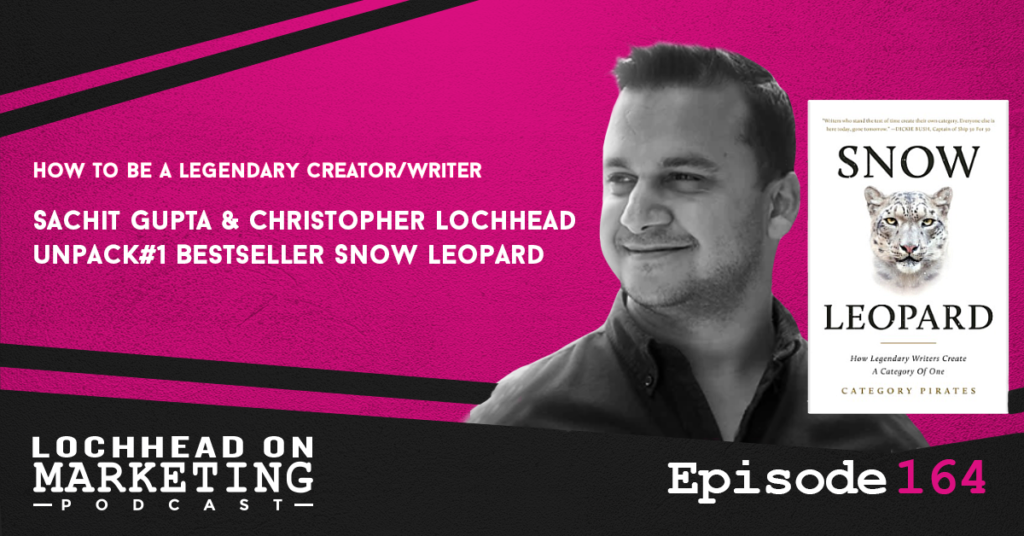
Podcast (lochheadonmarketing): Play in new window | Download (Duration: 1:37:55 — 67.2MB) | Embed
Subscribe: Apple Podcasts | Spotify | RSS | More
Recently, I was a guest with the legendary Sachit Gupta on his fantastic podcast called Conscious Creators, which I highly recommend. During our conversation on his podcast, we unpack Category Pirates’ most recent book Snow Leopard. Our producer Jason DeFilippo heard this podcast and thought it’d be a great idea to drop it here for you.
What you’re about to hear is me and Satya go deep on what it takes to be a successful native digital creator slash writer.
Welcome to Lochhead on Marketing. The number one charting marketing podcast for marketers, category designers, and entrepreneurs with a different mind.
The Reason for Podcasting
The conversation starts off with a discussion of how the two first met, and it was through the legendary podcaster Jordan Harbinger. Christopher was looking into getting sponsors and thinking about was to monetize his podcast, and was recommended to Sachit Gupta this way.
While he did get ideas on different styles of monetization, the biggest thing that Christopher got out of the conversation was the realization that monetization was not his primary focus on doing podcasts.
“I sort of had this aha that said, “Hey, wait a minute, dude, this was actually never about money”. And if I want to make money, I know how to go do that. So you sort of set my head straight, and that the emphasis was on the wrong syllable that if I wanted to make money, I knew how to go make money in a way that was much more exponential than being essentially an ad salesperson.
The real gift you gave me around podcasting, was that I’m not doing this to monetize.”
– Christopher Lochhead
Sachit Gupta on Monetizing Directly vs Indirectly
One of the things that Sachit wanted to share was that one doesn’t have to monetize directly. Focus on making good content first and foremost, so that you can reach out and cultivate an audience naturally, rather than going for cookie-cutter approaches for a short-term viral status.
“Here’s what I see happening in this greater world right now: there’s a stat that I think like 75% of youngsters want to be YouTubers, and the path most of them see in front of them is go on YouTube or something else and create content that’s for the extremes, because that’s what spreads. And then once you chase views and get to a certain level of audience, you can monetize in some way, right. And if you don’t become big, you can’t monetize. In your book, you call like the obvious content, which is not really the stuff that’s useful.”
– Sachit Gupta
While there is merit to uploading consistent content, you don’t have to flood your audience with bit-sized content that is just a big nothing burger. Creating meaningful content, let’s say once every week or two is way better than just dropping portion-sized content that just adds to the collective brain-rot of society.
The Content Pyramid
The topic then shifts to the concept of the content pyramid, and what types of people thrive in each level.
Consumers, for example, are at base of the pyramid and consists of the largest section of it. In internet culture, there is something known as the 1% rule, which states that on social media platforms, 1% create while 99% consume.
Most people spend their entire lives being content consumers—not content creators. And that’s totally fine, so long as you understand you’re not “playing the game.” You’re sitting on the sidelines watching the game.
In order to “get in the game,” you must move out of consumption and up The Content Pyramid.
To hear more of the conversation between Sachit Gupta and Christopher Lochhead, download and listen to this episode.
Bio
Connect with Sachit Gupta!
Website | Conscious Creators Show | Twitter | Instagram | LinkedIn
We hope you enjoyed this episode of Lochhead on Marketing™! Christopher loves hearing from his listeners. Feel free to email him, connect on Facebook, Twitter, Instagram, and subscribe on iTunes!
264 Why Startups Should Slow Down, Why Hospitals Are Like Airlines, What’s Next with Covid19, Theranos, & The War In Europe with #1 HealthTech Investor Bryan Roberts
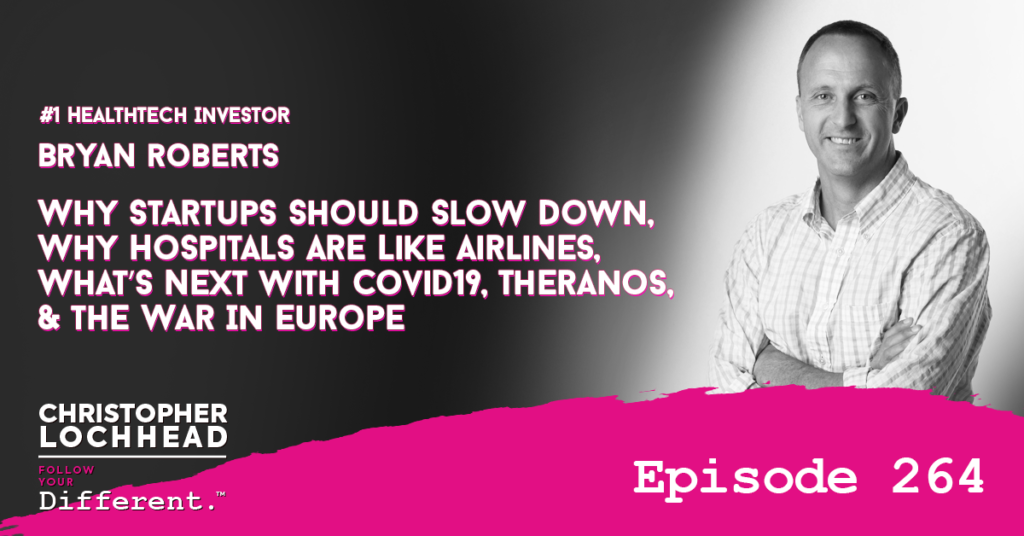
Podcast: Play in new window | Download (Duration: 59:47 — 41.0MB) | Embed
Subscribe: Apple Podcasts | Spotify | Pandora | RSS | More
On this episode of Christopher Lochhead: Follow Your Different, we have a conversation about a wide range of topics. From why startups should slow down, the current state of Covid19 and how it has affected our healthcare systems, to Silicon Valley’s response to Russia’s attack on Ukraine. Who better to have this conversation than with one of the smartest minds I know, Bryan Roberts.
Bryan Roberts is a Senior Partner at legendary venture capital firm Venrock in Silicon Valley. He is the man that many people consider the number one healthcare tech VC on the planet.
So if you want to know our thoughts and be part of the dialogue, stay tuned to this episode. Also, pay special attention to what Bryan thinks CEOs should be thinking about and doing to survive and thrive over the next 12 months.
Bryan Roberts on the Growth of Startups
We open up the conversation about the state of startups over the past 6 months. According to Bryan, the have been some noticeable changes on how the public and markets interact recently. Before, when the public markets go down, it usually takes 6-12 months before the private markets also start going down. This is because those two markets are working on different capitals. But recently, there has been a crossing over of public to private and vice-versa, which has made the shifts in the market almost simultaneous due to these crossovers.
Bryan Roberts then talks about how he wishes startups would slow down a bit. He knows that this is contrary to the current popular belief that blitz-scaling and creating value quickly for your product is better, but he has this to say on the matter:
“I think there’s something to be said for, for getting your stuff right. Like, it takes 10 years to build a good product, and probably takes 5 years to build a functional product that you’re embarrassed about.” – Bryan Roberts
For Bryan, rushing growth might look good in the short term, but it might not translate the same long term. In 2-4 years, all your customers will figure out that the products are not delivering the value you are selling them for, and you are left with a declining product and scrambling for the next short-term fix.
Covid19 and Its Effects on Healthcare
On the topic of the pandemic, Bryan thinks that it has pushed changes in behavior towards healthcare forward for a decade or two in the span of a year. People suddenly have to learn things about healthcare they never bothered about before. They might get pissy or annoyed about it, but they still did it because it was an essential knowledge now. Virtual Primary Care and telemedicine are some of the examples of the things even older people had to learn and have access to.
Of course, it won’t replace the brick-and-mortar / traditional way we have access to medicine and healthcare. There are still some things that cannot be handled virtually or over the phone. But it is good that services that can transition over to remote access are doing so, and is reaching more people than ever.
Bryan Roberts on Covid Deniers
Despite all the evidence and news that has been going on, it seems that there are still people who downplay the severity of Covid19. While it has been tempered to lower numbers nowadays due to vaccines and weaker strains, it still doesn’t deny the fact that we got our collective asses kicked by this pandemic this past two years.
For Bryan, it would be a disservice to the countless healthcare workers and their efforts for the past couple of years if people continue to say that this pandemic was some government ploy or a way for healthcare to make more money.
He also stresses that it’s a dangerous line of thought, given how this particular virus operates. While past viruses like Ebola had such a high mortality rate that it eventually dies out when contained, Covid does not. Which means it has more time to spread. It can even spread before the person spreading it shows symptoms, so it’s really hard to say if a public space is safe or not, unless everyone follows protocols and whatnot.
To hear more from Bryan Roberts and his thoughts on different current events and developments in healthcare, download and listen to this episode.
Bio
Bryan Roberts joined Venrock in 1997.
He is based in Palo Alto and seeks to partner with early-stage entrepreneurs innovating across the healthcare and life sciences industries.
Bryan is currently involved with several companies across therapeutics, genomics, and HCIT, including 10X Genomics, Devoted Health, Element Biosciences, Encoded Therapeutics, Included Health (formerly portfolio companies Grand Rounds & Doctor on Demand), and Lyra Health. Past investments include Ariosa Diagnostics (acquired by Roche), athenahealth (NASDAQ: ATHN), Ikaria (acquired by Mallinckrodt), Illumina (NASDAQ: ILMN), Ironwood Pharmaceuticals (NASDAQ: IRWD), Sirna Therapeutics (acquired by Merck), and Zeltiq (acquired by Allergan).
Immediately prior to joining Venrock, Bryan received his Ph.D. in Chemistry & Chemical Biology from Harvard University. He received his B.A. from Dartmouth College.
Links
Find out more about Bryan Roberts
We hope you enjoyed this episode of Follow Your Different™! Christopher loves hearing from his listeners. Feel free to email him, connect on Facebook, Twitter, Instagram and subscribe on iTunes!
262 The $21.7T Metaverse Economy, Web 3.0, & The “Great Refactoring”, with #1 Tech Analyst R. Ray Wang, Founder of Constellation Research
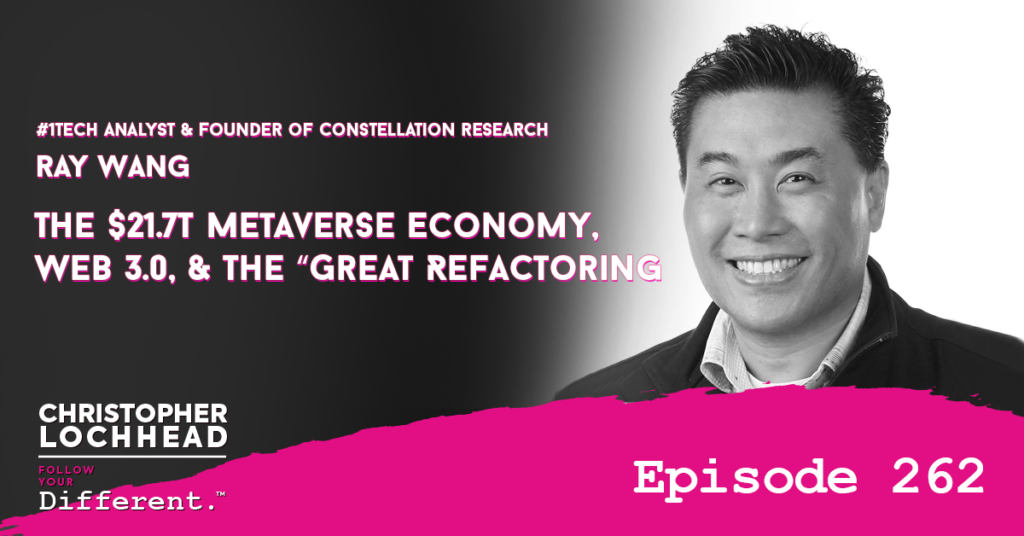
Podcast: Play in new window | Download (Duration: 1:35:51 — 65.8MB) | Embed
Subscribe: Apple Podcasts | Spotify | Pandora | RSS | More
On this episode of Christopher Lochhead: Follow Your Different, Ray Wang is back. Like always, we are in for a treat as we go deep into a whole bunch of topics.
Ray Wang is the world’s number one Tech Analyst, and the founds of Constellation Research. He is the author of the bestselling book; Everybody Wants to Rule the World. Ray also hosts his own very popular podcast, called DisrupTV.
So sit back and join us as we have a deep dialogue about Metaverse, the current status of Web 3.0, and the recent major events that are still affecting everyone to this day.
Ray Wang on the Metaverse Economy
The conversation starts off about the Metaverse and the Metaverse Economy. Ray explains that people’s concept of the Metaverse are still in the infancy stages right now. When they hear metaverse, they think AR, VR, or maybe gaming. Simply put, it’s 2D becoming 3D.
Yet according to Ray, there are bigger implications, particularly in the market it will bring in the future.
“The metaverse economy is something that we’re seeing as a $21.7 trillion market by 2030.” – Ray Wang
That sounds like a big number, because it is. Right now, publicly traded tech companies are valued at around $24 trillion. But if you look at it closely, these companies are gradually shifting into the digital space, which is what we now call as “metaverse”. Slowly but surely, the big companies have been positioning themselves in a strategic spot for when the technology catches up to the concept.
Ray Wang on Web 3.0
All of these changes have been possible by the advent of Web 3.0, which is powered by the blockchain and cryptocurrency. But what exactly is Web 3.0?
In order to explain it, you have to understand what the previous iterations were. Web 1.0 is basically a “Read” aspect of the internet. You can have access to websites, but there aren’t a lot of ways to interact with them. Web 2.0 changed that, moving into the “Read/Write” era of the internet. Now there are more services and functions that we can use over the net, but it comes at the exchange of data and information about the users.
Web 3.0 aims to give the users control over their data, like how blockchains can track every step of the transaction made, or how some can limit the amount of data or even restrict outgoing data from their device and browsers, much like what Apple did to Facebook and other social media platforms.
Or at least that’s the idea scenario. But according to Ray, it all depends on who’s holding the reins to the operation.
“These Metaverse economies by design are hopefully going to favor privacy and anonymity of the user, right? It’s gonna be about creating transparency of the seller and protecting your privacy in a transaction. That’s the intent, right? But like all good technology, it’s really about the people behind the intent.” – Ray Wang
Transparency vs Privacy
Speaking of data control, Ray mentions the recent move by Apple to give users the option to turn off data tracking from various apps has got Facebook bothered. Likely because that’s how Facebook gets most of its revenue by using said data to do targeted advertising and such. Moreover, showing that it could be done could open the floodgates to other tech companies to add such a feature in the future.
It seems Apple is taking it a step further, allowing its users to encrypt emails and essential use the iCloud as their own personal VPN when doing their business over the internet.
On the other hand, as FANG companies (Facebook, Amazon, Netflix, Google) seems to be reaching their saturation point (particularly Facebook and Netflix), Facebook moved to launch the Metaverse and rebranded the company to Meta.
Though the metaverse itself seems like a mega category waiting to happen, the issue lies on the fact that it doesn’t seem to be well-defined yet as to what its goals are. People have a vague idea, and some ideas that support the concept already exist. But it all seems like a premature move by Facebook, spurred by the flagging subscriber count and to clear their bad reputation & start from scratch.
In the end, it’s interesting how companies will approach both Transparency and securing the Privacy of its users in this era of Web 3.0.
Bio
R “Ray” Wang (pronounced WAHNG) is the Founder, Chairman, and Principal Analyst of Silicon Valley based Constellation Research Inc. He co-hosts DisrupTV, a weekly enterprise tech and leadership webcast that averages 50,000 views per episode and authors a business strategy and technology blog that has received millions of page views per month. Wang also serves as a non-resident Senior Fellow at The Atlantic Council’s GeoTech Center.
Since 2003, Ray has delivered thousands of live and virtual keynotes around the world that are inspiring and legendary. Wang has spoken at almost every major tech conference. His ground-breaking bestselling book on digital transformation, Disrupting Digital Business, was published by Harvard Business Review Press in 2015. Ray’s new book about Digital Giants and the future of business titled, Everybody Wants to Rule the World will be released July 2021 by Harper Collins Leadership.
Wang is well quoted and frequently interviewed in media outlets such as the Wall Street Journal, Fox Business News, CNBC, Yahoo Finance, Cheddar, CGTN America, Bloomberg, Tech Crunch, ZDNet, Forbes, and Fortune. He is one of the top technology analysts in the world.
Links
Follow Ray Wang today!
Website | Twitter | LinkedIn | Constellation Research | DisrupTV
Check out Ray Wang’s latest Book: Everybody Wants to Rule the World
We hope you enjoyed this episode of Christopher Lochhead: Follow Your Different™! Christopher loves hearing from his listeners. Feel free to email him, connect on Facebook, Twitter, Instagram, and subscribe on iTunes!
244 Digital and Analog Businesses with Robert Siegel, VC and Author of “The Brains and the Brawn Company”
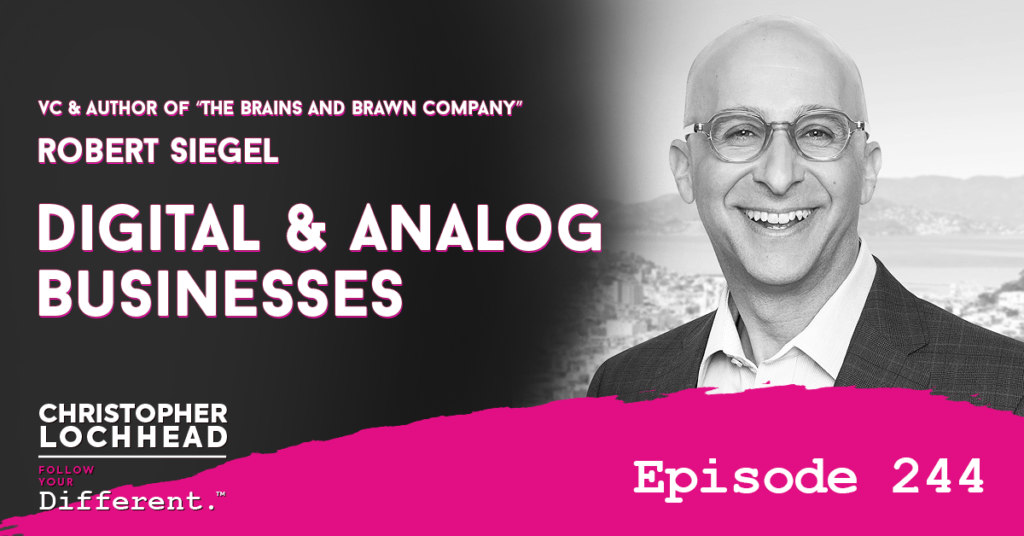
Podcast: Play in new window | Download (Duration: 1:12:09 — 49.5MB) | Embed
Subscribe: Apple Podcasts | Spotify | Pandora | RSS | More
Most businesses are now a hybrid of analog and digital. The question is, how do we get the right mix? Also, how do we know what and when to digitally transform, or keep parts of our business analog? These are just some of the questions that board CEOs and executive teams are grappling with. In this episode of Follow your Different, Robert Siegel will help us get a better grasp at it.
Robert Siegel is a Venture Capitalist and a Stanford lecturer. He has a new book out called The Brains and Brawn Company, and it cracks open many of these kinds of questions. It also provides real research and insight from leading companies in their respective industries, coupled with Robert’s years in Silicon Valley and the entrepreneurial world.
If you’re building companies today, or you want to build a legendary company heading into the future, you’re going to love everything about our dialogue.
Robert Siegel on Digital Transformation
Digital Transformation seems to have become a catch-all phrase that people in the industry use to describe new technology or migrating certain things online.
While it may not seem like much of an issue. It becomes a problem when the supposed “experts” start suggesting that undergoing a Digital Transformation should be done ASAP to improve your company.
“I think that what I’ve learned in my time as a venture capitalist, and also in the teaching that I do at Stanford, is that digital transformation is kind of necessary, but not sufficient. That the world that we’re living in, is increasingly a blend of digital and physical.
And so if you only talk about digital transformation, everything talks about the ones and zeros. Everyone talks about software and connectivity. But people forget, we actually live in a physical world.” – Robert Siegel
The Brain and Brawn Company
We then get into the discussion of Robert’s new book, The Brain and Brawn Company. Robert explains that having both Brain and Brawns is necessary for a company. The Brain being the creative and analytical aspects of business, as well as the digital parts of it. While the Brawn is the physical aspects, like dealing with logistics, manufacturing, and such.
So the optimal setup is having a good mix of “brains” and “brawn” in your company. According to Robert, they don’t deal with those who wish to have a pure digital software platform, because that is not a sustainable model.
“Those companies aren’t going to be successful as we get into a world where things are increasingly blended between digital and physical, and every product and service that we make is connected. And every industry is going to be impacted from not only things like mobility, but healthcare, financial services, there really is education, there isn’t an industry that won’t be impacted by this blend of digital and physical.” – Robert Siegel
Of course, there are business that can go pure digital, but companies in general still need a good blend of digital and analog systems in place to function efficiently.
The Right Mix of Digital and Analog
That said, what is a good mix of digital and analog for a business?
According to Robert, it depends for each business. One of the things to look at is how different systems work in your company. After understanding them, find out if going digital can improve the service, or make it more efficient in the long run.
Of course, there are certain aspects that still need analog aspects, even within digital spaces. Take for instance ordering online. While the whole thing can be made digital nowadays, there are still analog competencies like logistics and customer experience that need to be accounted for. Or the opposite can also be true, like adding digital improvements to delivery tracking, so that customers know the real-time location of their on-going delivery.
So in the end, it’s best to find the right mix for your own company.
To hear more from Robert Siegel and how to find the right mix of digital and analog in your business, download and listen to this episode.
Bio
Robert Siegel is a lecturer in management and has led primary research and written cases on Google, Charles Schwab, Daimler, AB InBev, Box, Stripe, Target, AngelListopen, 23andMe, C3.ai, Majid Al Futtaim, Tableau, PayPal, SurveyMonkey, Medium, Autodesk, Minted, Zuora, Axel Springer, and Michelin, amongst others.
Robert is a member of the supervisory board of TTTech Auto AGopen, and is chairman of the strategic advisory board for TTTech Computertechnik AGopen in Vienna, Austria. He is a member of the industry advisory boards for HERE Technologiesopen and Tulcoopen, and is the copresident emeritus of Stanford Angels & Entrepreneursopen, an alumni association that fosters relationships to strengthen the Stanford startup community. Robert was on the board of SmartDrive Systemsopen for 14 years (acquired by Omnitracs), has coauthored several articles for the Harvard Business Reviewopen and California Management Reviewopen, and is a frequent contributor to Fortune, TechCrunch, VentureBeat and Forbes.
Robert was previously general manager of the video and software solutions division for GE Security, with annual revenues of $350 million. He was also executive vice president of Pixim, Inc., a fabless semiconductor firm specializing in image sensors and processors (acquired by Sony). Before Pixim, Robert was cofounder & chief executive officer of Weave Innovations Inc. (acquired by Kodak), a network services developer that invented the world’s first digital picture frame, and delivered photos and other digital media to PCs and internet / mobile devices.
Robert served in various management roles at Intel Corporation, including an executive position on their corporate business development team, in which he invested capital in startups that were strategically aligned with Intel’s vision.
Robert is the coinventor of four patents and served as lead researcher for Andy Grove’s best-selling book, Only the Paranoid Survive.
Robert holds a BA from UC Berkeley and an MBA from Stanford Graduate School of Business. He is married with three children.
Links
Follow Robert Siegel today!
Website: RobertESiegel.com
LinkedIn: in/RSiegel
Twitter: @RobSiegel
Read his new book: The Brains and Brawn Company
We hope you enjoyed this episode of Follow Your Different™! Christopher loves hearing from his listeners. Feel free to email him, connect on Facebook, Twitter, Instagram, and subscribe on iTunes!
220 Think Like Amazon with John Rossman
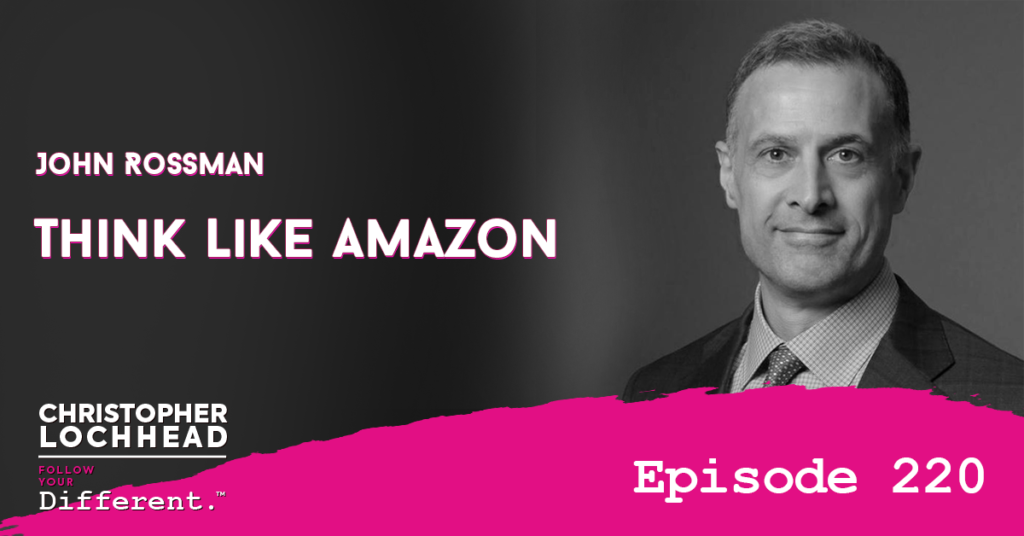
Podcast: Play in new window | Download (Duration: 1:01:35 — 42.3MB) | Embed
Subscribe: Apple Podcasts | Spotify | Pandora | RSS | More
In 2020, Amazon.com became an essential service in America. The company is now worth $1.6 trillion, and has become one of the greatest B2B companies in history, the Category King of E-commerce. Amazon Web Services is also the fastest growing B2B tech company ever.
It’s shocking that one company is dominating on both the consumer and enterprise technology side in a way that we’ve never seen one company do before.
On this episode of Follow Your Different, our guest today is the expert on the Amazon Way. As a matter of fact, he wrote the book on it. John Rossman is an extraordinarily sought-after author, speaker, and thinker in business, because he is teaching all of us how to be like Amazon.
John Rossman is the author of The Amazon Way, a former Amazon Leader and Managing Partner at Rossman Partners. In his new book, John breaks down the Amazon leadership principles and how we can learn to innovate and compete in the digital era. So if you’re interested in learning more, you’ll love everything about this conversation.
Compete Differently
John Rossman shares what his inspiration was to making the book. For him, it was a matter of getting the word out and letting people know what you can learn from Amazon’s business strategies. You can then use these to incorporate into your business culture and leadership approach so you can better compete in the market.
“That’s kind of the fair way that I play. And I just love the notion of like, we got to compete differently and that is what you Amazon is teaching us. That’s what I try to take away and give to my readers.” – John Rossman
The American Story
John talks about a bit of history on how Amazon came to be, and thinks that it doesn’t get highlighted enough that Amazon and Jeff Bezos is the American Story people aspire to have. He’s someone who bet on himself, left his cushy job and went all in on his idea.
It took Amazon literally two decades to become the juggernaut we know them to be right now, and it was not without its problems. Though despite these problems, Amazon continued to push on and in these bad times came the leadership principles that they continue to follow to this day.
“Those are the leadership lessons I learned so much from and his consistency in beliefs, like them or not, at least they’re consistent, and they’re super well-articulated. And so I think that that is a big story that that doesn’t get told enough.” – John Rossman
Pushing On Despite Criticisms
John recalls how it was like in the early 2000s, particularly on how media and the public perceived Amazon. Other entrepreneurs and business leaders didn’t believe that they could succeed, and they were always doubted.
Yet when you look at Amazon today, it’s as though it is an essential service for everyone. That’s saying a lot for something that is owned by a private entity.
He also shares how Amazon handled the situation once the pandemic hit. Unlike other businesses and services that bided its time and waited, Amazon focused their attention on how to deliver the best service they could despite the on-going situation.
To say it paid off would be the understatement of the year.
“All you remember the days of like, the grocery store shelves being barren and everything, right? Amazon was the answer, dude on toilet paper for Fox, and food and things like that. They did an amazing job at quickly shifting, and the thing I was pointing out to everybody is like, it didn’t happen by accident.” – John Rossman
To hear more from John Rossman and on how your business can be like Amazon, download and listen to this episode.
Bio
John Rossman
Digital and Innovation Advisor
Mr. Rossman is an expert at digital business models, operations and organizing programs. He has led engagements on developing innovation processes, Internet of Things strategies, marketplace and API driven platform business models.
He is a sought-after speaker on creating a culture of operational excellence and innovation.
Mr. Rossman has worked with clients across various industries, including retail, insurance, education, healthcare, consumer products, industrial products and transportation.
Mr. Rossman’s notable assignments include The Bill and Melinda Gates Foundation, Microsoft, Nordstrom and several of the world’s leading retail and insurance organizations.
Prior to Rossman Partners, John was a Managing Director at Alvarez and Marsal, a performance improvement consulting firm.
Prior to A&M, John was an executive at Amazon.com where he launched the Marketplace business and third-party selling platform, and ran the merchant services business.
Links
Connect with John!
Website: The-Amazon-Way.com
LinkedIn: in/John-Rossman
Twitter: @JohnERossman
Get the Book: The Amazon Way: Amazon’s 14 Leadership Principles
We hope you enjoyed this episode of Follow Your Different™! Christopher loves hearing from his listeners. Feel free to email him, connect on Facebook, Twitter, Instagram, and subscribe on iTunes!
199 How to Redesign Your Life w/ Eric Jorgensen

Podcast: Play in new window | Download (Duration: 1:11:44 — 49.3MB) | Embed
Subscribe: Apple Podcasts | Spotify | Pandora | RSS | More
At the moment, there is a big rise in “diseases of despair.” These are things like substance abuse, alcohol dependency, suicidal thoughts and behaviors. As a matter of fact, according to the medical journal BMJ, diseases of despair have soared in the United States over the past decade, rising 68% between 2009 and 2018. The study also shows suicidal thoughts and behaviors were up 70%. And all of that was of course before COVID.
However, despair doesn’t have to mean defeat. Our guest today, Eric Jorgensen is an extraordinary man. His son, William was born with significant disabilities. What you’re about to hear is the extraordinary tale of how Eric’s life turned to tragedy, the horrible suffering that he endured and the painful events of Eric and William’s life. You’ll also hear how this real American hero transformed, unbearable despair into triumph.
Road to Healing
Life often throws us whirlwinds of challenges, tragedy, and sometimes even despair. Eric shares his tale of how he has withstood the hardships of having cancer and taking care of his son with significant disabilities. He shares his extraordinary story of recovery, all the while dealing with the global pandemic, Covid-19.
“When I found out it was grade IIA cancer. I guess in the scheme of things, I was somewhere in the middle. I didn’t need chemo. I didn’t need radiation. In terms of recovery, I got really lucky. It was just a matter of taking care of my wound and letting it heal…In regard to COVID, alI I could think about is holy crap. It was scary. If I get sick, on top of cancer, and I can’t help my son out on his day to day stuff, what’s going to happen. Who’s going to do that for me?” – Eric Jorgensen
Channel Your Anger
The ability to appropriately express and channel one’s anger is one of the most important things about being human. Eric discusses how his anger, while not always constructive, was the driving force for him to start his own company. Rising through all this frustration and anger, it was able to lead him into where he is now.
“I was getting frustrated because what I was being asked to do, wasn’t what I wanted to do. It wasn’t helping the people I wanted to help. It wasn’t addressing the need I thought it needed to be filled… Now that I started my company ,I get to help families who are where I was eight years ago. Not knowing what to do and I’m catching them before they get there.” – Eric Jorgensen
Know You’re Not Alone
Eric shares his big learnings as he looks back over the last eight years of his life and how he has navigated through his challenges. One of the things he wants people to remember is that don’t try and do everything alone. Everyone is strong but oftentimes, one needs someone they can lean on and trust.
“I kept it balled in and then it would shockingly blow up at the worst possible time. I would take it out on people that I had absolutely no reason for me to take it out on. So try to build a team or a tribe or whatever you call it. Try to build a group of people. I keep my circle pretty small. Get a couple of really tight people that you can really really trust.” – Eric Jorgensen
To know more how to redesign your life with Eric Jorgensen, download and listen to this episode.
Bio:
Eric has been helping families with intellectual and developmental disabilities since his retirement from the Navy in 2012.
He was widowed the same year he retired.
At the time his 12 y/o autistic son, William, was completely dependent on his wife for everything.
It was his frustration with the difficulty of figuring out what to do and navigating services for his son which led him to found Special Needs Navigator.
Eric created the category of Special Needs Planning to help families, individuals and caregivers connect the dots when working with attorneys, financial advisors, and other professionals.
His specialty is helping them identify what they don’t know and provide clarity. He works with his clients around the country to develop individualized solutions best suited to their circumstances.
In addition to working with clients one on one; Special Needs Navigator has a blog, YouTube channel and podcast. Eric uses the blog to do a deep dive every week into subjects like ABLE accounts, Special Needs Trusts and other topics families frequently have questions about.
The podcast and YouTube channel focus on benefits, resources and services families may not know, or want to learn more, about.
Links:
Website: Special Needs Navigator
Podcast: ABC’s of Disability Planning
Facebook: @SpecNeedsNav
Twitter: @NeedsNavigator
A New Study Found ‘Deaths Of Despair’ Soared Over The Past Decade
We hope you enjoyed this episode of Follow Your Different™! Christopher loves hearing from his listeners. Feel free to email him, connect on Facebook, Twitter, Instagram, and subscribe on iTunes!
198 The Future of Tech with #1 Tech Analyst R “Ray” Wang Chairman Constellation Research
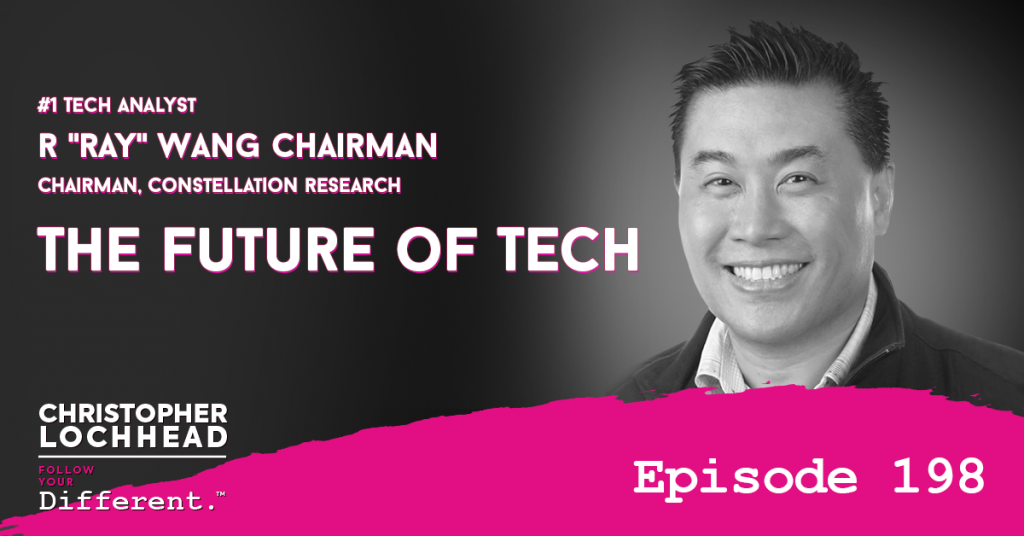
Podcast: Play in new window | Download (Duration: 52:56 — 36.3MB) | Embed
Subscribe: Apple Podcasts | Spotify | Pandora | RSS | More
What really happened in 2020? Where’s the world of technology heading? What does the future of software look like and what do we all have to be prepared for? We discuss all these and a whole lot more with Ray Wang. He’s the number one tech analyst in the world and the founder of Constellation Research. Today, give us some powerful insights as we go forward into 2021.
Salesforce Slack
Christopher and Ray dive into the discussion with COVID hypocrisy and Ray’s thoughts on the Salesforce Slack $27 billion deal, and where he sees the future of technology headed. He emphasizes the idea of business graphs and how this can potentially tap tribal knowledge for business and become a great acquisition. It is the kind of category acceleration deal that is fit for category designers, visionary entrepreneurs and CEOs who are trying to shape the future as opposed to monetizing the present or past.
“Why would we want a business graph in our business? The goal of the business graph is so that we can start making better decisions. We call them precision decisions and the goal is to improve this concept called decision velocity. Which, I talk a lot about in my book, are basically machines making decisions a hundred times per second.” – Ray Wang
Ad Revenue
Ray discusses how top companies like Google, Facebook, and Microsoft are competing head-on for digital advertising revenue. A massive winner takes all market and digital ads of category kings who are running some of the largest market shares in each of their categories. These category kings are battling for six areas of monetization: ad revenues, search revenues, goods, services, and membership subscriptions.
“There’s all your digital monetization models. Now I won’t say too much before my book comes out. That’s what we spent a lot of time talking about. These different monetization plays that are happening. We talk about how value chains are collapsing, but in Salesforce and in Microsoft’s case, they’re building this business operating system or this business nervous system. That’s actually coming in the transactions between sales orders.” – Ray Wang
Zoom in Light of Slack Salesforce Deal
Through every single video revolution the problem with video was there was never enough bandwidth. Ray shares how Zoom needs to go beyond meetings and discover the ability to integrate with everyone else. Whether this means selling at their peak and letting other people build or integrate into a future broadcast platform.
“You have your own personal ad network with the zoom. You’re basically internal only. I mean, they have the ability to do all those kinds of things. You can actually do broadcasts. You are a video property. You are basically a media property. They haven’t taken it from tool to where now the broadcast property kind of like YouTube is the broadcast pot property. So someone who’s creative enough thinking about this market that wants to go after it pretty hard could attempt to kind of work with them in that regard. Though the valuation is so high, right? That’s the challenge.” – Ray Wang
Bio:
R “Ray” Wang (pronounced WAHNG) is the Principal Analyst, Founder, and Chairman of Silicon Valley based Constellation Research, Inc.
He’s also the author of the popular business strategy and technology blog “A Software Insider’s Point of View”.
With viewership in the 10’s of millions of page views a year, his blog provides insight into how disruptive technologies and new business models such as digital transformation impact brands, enterprises, and organizations.
Wang has held executive roles in product, marketing, strategy, and consulting at companies such as Forrester Research, Oracle, PeopleSoft, Deloitte, Ernst & Young, and Johns Hopkins Hospital.
His new best selling book Disrupting Digital Business, published by Harvard Business Review Press and now globally available provides insights on why 52% of the Fortune 500 have been merged, acquired, gone bankrupt, or fallen off the list since 2000.
In fact, this impact of digital disruption is real. However, it’s not the technologies that drive this change. It’s a shift in how new business models are created.
Wang has held executive roles in product, marketing, strategy, and consulting at companies such as Forrester Research, Oracle, PeopleSoft, Deloitte, Ernst & Young, Personify, and Johns Hopkins Hospital. He is a prominent and dynamic keynote speaker and research analyst working with clients on digital, innovation, business model design, engagement strategies, customer experience, matrix commerce, and big data.
His Silicon Valley research firm, Constellation Research, Inc., advises Global 2000 companies on the future, business strategy, and disruptive technology adoption.
Ray is a regular contributor to Harvard Business Review and well quoted in The Wall Street Journal, Forbes, Bloomberg, CNBC TV, Reuters, IDG News Service, and other global media outlets. Wang has thrice won the prestigious Institute of Industry Analyst Relations (IIAR) Analyst of the Year Award.
Links:
Constellation Research: Ray Wang
Personal Log: Understanding Case Fatality Rates For #COVID19 #CoronaVirus
We hope you enjoyed this episode of Follow Your Different™! Christopher loves hearing from his listeners. Feel free to email him, connect on Facebook, Twitter, Instagram, and subscribe on iTunes!
181 How To Build Legendary Software | Tim Tully CTO of Splunk
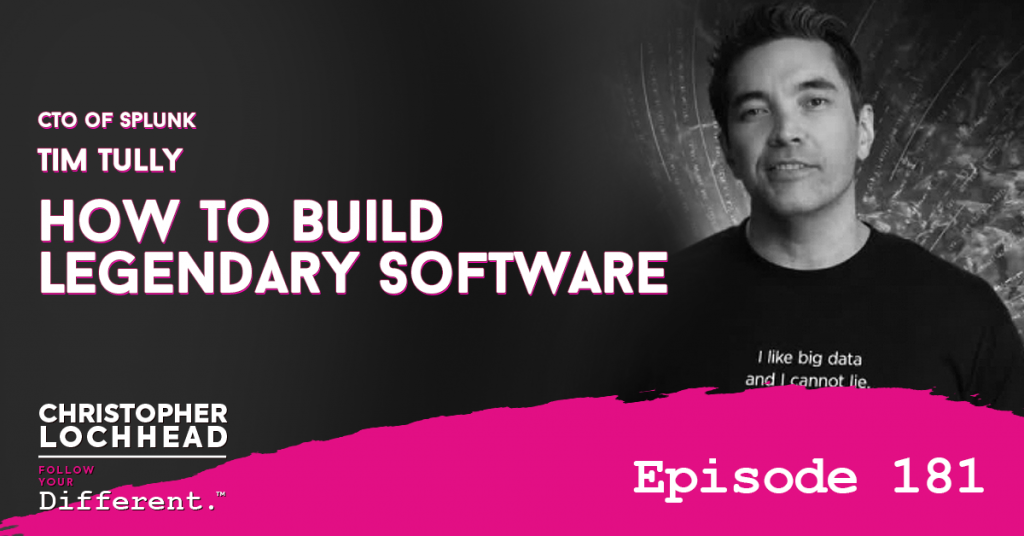
Podcast: Play in new window | Download (Duration: 57:45 — 39.7MB) | Embed
Subscribe: Apple Podcasts | Spotify | Pandora | RSS | More
Tim Tully is one of the most legendary technologies and product leaders of this generation. He is the Chief Technology Officer of $35 billion market cap company Splunk. He also runs the engineering, product, and tech operations.
In this episode, we get into all of it, how to execute a big, bold product vision, what it takes to run a major technology organization in the era of COVID. Find out why Tim thinks that software needs to be indulgent in the way that it delivers an experience and much more.
Born To Code
Tim was at Yahoo for years. He did a ton for Yahoo’s modern business. Most notably, Tim was on the team that helped to create the open-source database Hadoop. If you’re in the tech world, you know how big a deal that is. If you’re not, well Google it and you’ll see but Hadoop is a major contribution to the data world.
He shares in this episode how he grew up from a “tech household,” as both his parents were programmers from Silicon Valley in the 70s.
“Obviously coding is one way that I can do a lot of things in a very flexible way and have a lot of control over a system.” – Tim Tully
Inside Tim’s Mind
Tim shares that his thoughts are classified into two things: what he wants to try to do next or what am he wants to try to improve. He is in constant search of how to improve things and how to solve a problem in front of him. He shares that although its innate in him to solve problems on his own, the real challenge of leading a team is how to help your team solve the problems with you.
“If you’re like a true engineer, it’s really hard to let go of just solving every problem yourself. You have to very quickly learn that there’s a team that needs to get the job done. You’re not helping the team by solving the problem for them. What your job is to remove roadblocks and help them solve the problem and bring them along.” – Tim Tully
Leading The Team
Tim also shares how he as Splunk’s CTO is responsible not only for vision but also for delivering products since he is also the head of engineering. He gave a great insight into how his team works and ultimately, how he leads his team of champions.
“I learned over time is the very best architects that you can have in a company, I think we have that here at Splunk. You know, they obviously have high IQ, but they have to have high EQ because the problem is they have to be able to influence and persuade large swaths of people without directly managing them.” – Tim Tully
To know more about Tim Tully and how to build a legendary software, download and listen to this episode.
Bio:
Tim has served as Splunk’s Chief Technology Officer since 2017.
Prior to joining Splunk, he spent 14 years at Yahoo in various roles, including leading engineering for the Media Organization, where his teams developed leading brands such as Yahoo.com, Yahoo Finance, Yahoo Sports, Yahoo Fantasy, Tumblr, Huffington Post, and Flurry.
He previously served as Yahoo’s Chief Data Architect, where he led architecture across all data teams and developed much of that stack as well.
Before that, Tim served as a Member of Technical Staff at Sun Microsystems in the JavaSoft team.
Tim holds an M.S. from Carnegie Mellon University and a B.S. from the University of California, Davis.
Links:
Linkedin: Timothy Tully
Splunk CEO Doug Merritt on Episode 166
We hope you enjoyed this episode of Follow Your Different™! Christopher loves hearing from his listeners. Feel free to email him, connect on Facebook, Twitter, Instagram, and subscribe on iTunes! Get amazing, different stories on business, marketing, and life. Subscribe to our newsletter The Difference.

